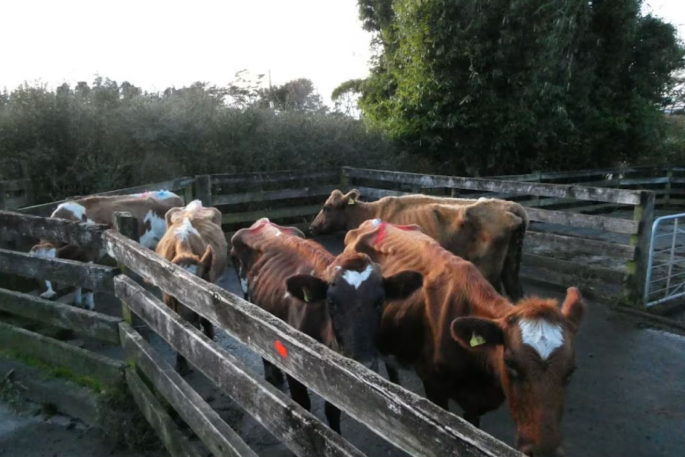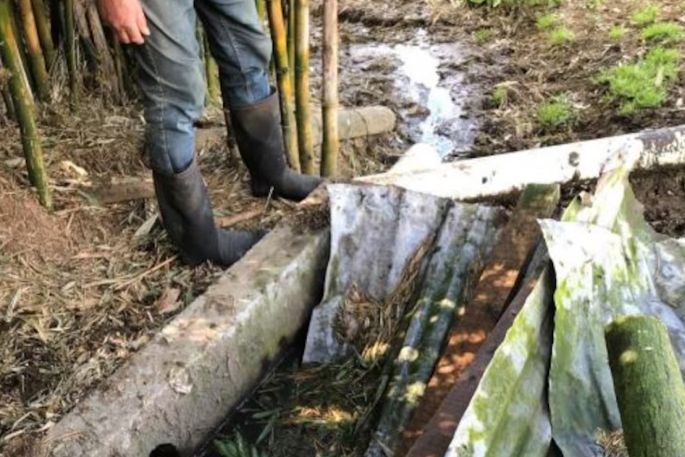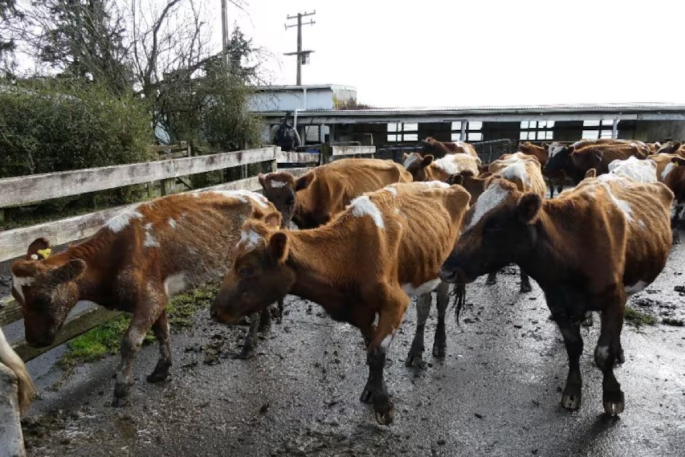
Warning: This story contains images and content that some readers may find upsetting.
When animal welfare inspectors arrived at a farm where John Nettleingham was in charge of the dry stock, they found “emaciated” cattle that had very little grass to feed on.
And, it wasn’t the first time inspectors found ill-treated cattle there - similar issues were discovered at the Aongatete property in the Bay of Plenty in 2019.
As a result of the most recent inspection in June 2023, 22 of the herd had to be put down, as the “lack of proper and sufficient feed was so severe” they had “extremely low body condition”.
A further three were put down by the 65-year-old farmer in the following days after they became unable to stand.
John was employed by his elderly father Francis, who’s in his 90s.
On Friday he was sentenced on two charges - one related to not providing sufficient food for cattle, and the other for recklessly ill-treating cattle, to the extent they needed to be euthanised.
He was fined $25,956, had to pay vet costs of $5,173.78, and is subject to a disqualification that restricts what he can farm.
The disqualification order will remain in place for a minimum of two years, after which he will need to apply to the court to have it lifted.
He can have no more than a maximum of 80 bovine cattle over the age of 12 months; no more than a maximum of 60 bovine cattle under the age of 12 months but over 4 days of age; and no more than three bovine bulls at any time.
The day before the search warrant at the farm, 96 bulls and weaners, which are cattle that are 6 to 12 months old, had been sent to the saleyards.
The report by the vet says the farm was overstocked with insufficient feed.
“These numbers are so extreme that I would consider the situation on this farm to be a severe and urgent welfare concern, even if the approximately 90 cattle that had been removed from the property just prior to our visit were in good body condition.”
The majority of the property had minimal grass cover and had been grazed very low.
Of the 96 cows that were assessed for body condition, 42 were extremely thin and in need of urgent remedial action to survive and 24 were marginal.
In explanation, John says that at the start of 2023, he realised the farm was overstocked.
He says there were fencing issues that allowed stock to move freely between paddocks, which impacted pasture management.
He’d purchased additional hay bales of supplementary feed, but 68 of those were found to be mouldy and were rejected by the stock.
He admitted to continuing to feed out a combination of the mouldy bales along with better quality bales, as he wanted to get rid of them before the cold weather.
By May 2023, he realised some cows were starting to lose condition and by June, they were going downhill quickly.
He did not engage a veterinarian as he felt the issues with the stock were solely feed-related and things could improve by reducing stock levels.
The summary of facts says that since the search warrant in June 2023, John and his father have hired a farm consultant and invested in significant improvements to the farm.
Animal welfare is everyone’s responsibility
Ministry for Primary Industries’ Regional Manager of Animal Welfare and NAIT Compliance Brendon Mikkelsen says MPI accepts the outcome of the court and says they were serious charges under the Animal Welfare Act.
This included recklessly ill-treating 22 cattle that had to be euthanised to end their suffering, along with failing to ensure a mob of 89 cattle received proper and sufficient feed.
“Animal welfare is everyone’s responsibility and MPI strongly encourages members of the public who are aware of animal ill-treatment or cruelty to report it to MPI.”
The farm had previously been a dairy farm, during which time John was sentenced on three charges of failing to provide sufficient food to 148 cows across three separate mobs, in 2019.
At that time, he was also sentenced for keeping a dairy cow alive when she was suffering unreasonable or unnecessary pain or distress.
 A vet says the farm was overstocked with insufficient feed, which had led to the cattle being underfed. Photo: NZME.
A vet says the farm was overstocked with insufficient feed, which had led to the cattle being underfed. Photo: NZME.
He was fined $6750 and disqualified for two years from being the owner or person in charge of more than 97 bovine animals over the age of 6 months and 20 replacement calves at any one time.
Effluent discharge on the farm
In March 2023, John and his father were fined $28,000 for illegally discharging untreated dairy effluent, which ended up in a tributary of the Aongatete Estuary.
The pair were prosecuted by the Bay of Plenty Regional Council and pleaded guilty to discharging a contaminant, namely dairy effluent, on to or into land in circumstances where it entered a waterway.
The illegal discharge happened on October 13, 2021.
At that time, the John operated as a small calf-rearing enterprise, milking about 30 cows to feed the calves, and held a resource consent to discharge untreated dairy effluent to pasture by an irrigator.
 Untreated effluent flowing from a storm water diversion pipe on the Nettleinghams' dairy farm at Aongatete towards a gully. Photo / Bay of Plenty Regional Council.
Untreated effluent flowing from a storm water diversion pipe on the Nettleinghams' dairy farm at Aongatete towards a gully. Photo / Bay of Plenty Regional Council.
When a regional council compliance officer inspected the farm on October 13, 2021, they found a pipe system from the cowshed was set to divert the flow of washdown water into the stormwater diversion pipe leading to a gully rather than directly into an effluent storage system.
Green effluent had discharged from the pipe onto land, then into a gully below, and there was ponded effluent on the ground at the outlet of the stormwater diversion pipe, as well as effluent flowing along a channel in the gully.
The gully passed through a culvert into a drain that flowed into Tauranga Harbour about 450m downstream and into a tributary of the Aongatete Estuary immediately downstream from the farm. The effluent flow was “continuous” and the effluent storage tank was “overgrown with grass and weeds”.
Aongatete Estuary was classified as an indigenous biological diversity area due to the presence of threatened birds, fish, high-quality estuarine vegetation and as of national significance.
Dairy effluent was high in organic matter and had “very high” nutrient, ammonia and bacterial levels which can cause excessive weeds, contribute to algae blooms - which can be toxic to fish and other aquatic life and is also a heightened health risk for recreational users.
Judge David Kirkpatrick imposed fines of $14,000 on each farmer at the time, after allowing a 5 per cent discount for their “relatively good records” and their guilty pleas.
“There does not appear to have been any fault or problem with the elements of the [stormwater and effluent diversion] system, only with the way in which the defendants used it. Fortunately, the scale of the milking operation on this farm meant the consequences were less than regularly seen in cases coming before the Court,” the judge’s sentencing decision stated.



0 comments
Leave a Comment
You must be logged in to make a comment.